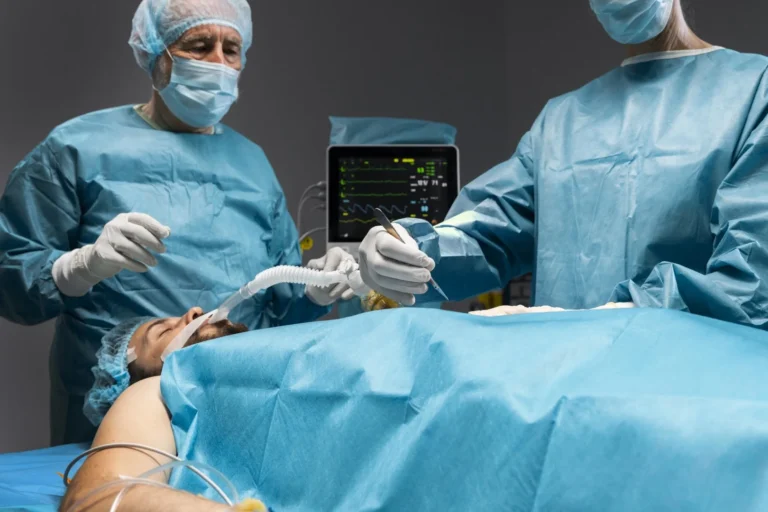
Bariatric surgery, often known as weight reduction surgery, is a medical operation aimed at helping people with extreme obesity lose weight by adjusting their digestive tract. This surgical procedure is often explored when other weight-loss strategies, such as diet and exercise, have proven ineffective.
Weight loss surgery isn’t a free hazard, and people must be fully assessed for their fit. Diseases such as blood clots, hernias, and malnutrition are all potential concerns.
Yet, for many people with extreme diabetes, having bariatric surgery can result in major weight loss and benefits in obesity-related health issues such as type 2 diabetes, hypertension, and sleep apnea.
Furthermore, it frequently leads to improved quality of life and longevity. Nonetheless, patients must commit to making lifestyle changes, such as eating a nutritious diet and exercising regularly, to have long-term success after surgery.
Thus, extensive pre-operative counselling and post-operative assistance are critical for bariatric surgery programs.
One of the most popular kinds of bariatric surgery is this one.
To avoid cutting through a section of the stomach and the first segment of the small intestine, the surgeon builds a little pouch at the top of the stomach and links it directly to the small intestine.
This lowers the absorption of calories and nutrients and limits the amount of food the stomach can hold.
After this treatment, a major section of the stomach is removed, leaving behind a pouch the size of a banana that resembles a sleeve.
Weight reduction results from the smaller stomach’s ability to hold less food.
The intestines are not redirected during this procedure, in contrast to gastric bypass.
To form a little pouch, an inflatable silicone band is wrapped around the upper portion of the stomach during this treatment.
Through a port positioned beneath the skin, saline can be added or removed to modify the band.
This procedure is less common and is usually only performed on severely obese patients.
To reduce food intake and absorption, a significant section of the stomach is removed, and the intestines are rerouted.
Although the technique leads to significant weight loss, the limited absorption of nutrients increases the risk of nutritional deficiencies.
This is a condensed form of the conventional gastric bypass procedure.
It entails cutting a long, thin tube from the stomach pouch and joining it to the small intestine’s bottom portion.
By limiting the amount of food taken and decreasing the absorption of calories and minerals, the surgery helps patients lose weight.
A bariatric surgeon will initially schedule an initial meeting with patients who have considered undergoing bariatric surgery.
The surgeon will conduct a physical examination, go over the patient’s medical history, and go over the various bariatric surgery choices at this visit.
The patient’s BMI (body mass index), any obesity-related medical issues, and prior weight loss attempts will all be taken into consideration by the surgeon when determining the patient’s eligibility for surgery.
Upon deciding to proceed with surgery, patients will undergo a thorough preoperative assessment to determine their general health and surgical readiness.
This assessment may include blood tests, imaging investigations (such as X-rays or ultrasounds), and consultations with other medical professionals—such as a psychologist or nutritionist.
Additionally, patients will be given advice on how to prepare for surgery, which may include dietary modifications, quitting smoking, and prescription adjustments.
Patients will go through a comprehensive preoperative evaluation to ascertain their overall health and surgical readiness after electing to move forward with surgery.
This assessment may include blood testing, imaging tests (such as X-rays or ultrasounds), and consultations with other medical specialists (like dietitians or psychologists).
The specific bariatric surgery method (e.g., gastric bypass, gastric sleeve, etc.) chosen will determine the surgical approach employed.
The surgery will be carried out following the planned surgical strategy by the surgeon, who will make the required incisions to get access to the abdominal cavity.
To reduce trauma and speed recovery, specialized tools and, in certain situations, laparoscopic (minimally invasive) procedures may be utilized during the procedure.
Patients will be moved to a recovery area after the procedure, where they will be closely watched as they emerge from anaesthesia.
Medication for pain control will be given to make sure you’re comfortable during the first stages of recovery.
Patients will restart oral intake gradually, working their way up to solid foods as tolerated, starting with clear liquids.
After surgery, the majority of patients stay in the hospital for a few days to make sure they are stable and healing properly.
Patients will schedule routine follow-up sessions with their surgical team to discuss any concerns and track their progress after being discharged from the hospital.
Assessments of weight loss, nutritional conditions, and any possible problems may be part of these follow-up appointments.
To guarantee the effectiveness of bariatric surgery and to give patients continuous assistance while they adjust to their new lifestyle, long-term follow-up is crucial.
Bariatric surgery myths are frequently spread due to misconceptions and a lack of information. Here are some common examples:
Myth: Bariatric surgery provides an easier way out.
Reality: While bariatric surgery can help with weight loss, longevity requires major lifestyle changes as well as a dedication to food and exercise. This isn’t an instant fix.
Myth: Bariatric surgery is quite hazardous.
Reality: Bariatric surgeries, like any other surgery, have inherent hazards, but breakthroughs in surgical methods have considerably reduced them. The advantages frequently outweigh the risks, particularly for people with extreme obesity and other health issues.
Myth: Bariatric surgery is the only option for weight loss.
Reality: Although bariatric surgery is an option for weight loss, it is not the only one. Many people achieve weight loss through food, exercise, behavioural changes, and medication. When these techniques fail or obesity-related health issues are severe, bariatric surgery is usually suggested.
One of Chennai’s best gastrointestinal clinics. We provide the most effective treatment for Gastrointestinal Tract, Gallbladder, Stomach, Colon, Rectum, Piles, fissures, and hernias.

© 2024 Marinas Clinic All rights reserved.Powered by Zero Gravity Technologies.